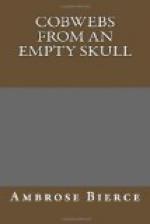Next morning the following “personal” appeared in the “Levant Herald:”
“P-ll-m-r-r.—All is over. The S-lt-n cleared his shelves of the old stock at midnight. If you purchased the Circ-n B-ties with the money I advanced, be sure you don’t keep them too long on hand. Prices are sure to fall when I have done buying for the H-r-m. Meet me at time and place agreed upon, and divide profits. G—d V—r.”
* * * * *
JOHN SMITH.
AN EDITORIAL ARTICLE FROM A JOURNAL. OF MAY 3rd, A.D. 3873.
At the quiet little village of Smithcester (the ancient London) will be celebrated to-day the twentieth, centennial anniversary of this remarkable man, the foremost figure of antiquity. The recurrence of what, no longer than six centuries ago, was a popular fete day, and which even now is seldom allowed to pass without some recognition by those to whom the word liberty means something more precious than gold, is provocative of peculiar emotion. It matters little whether or no tradition has correctly fixed the date of Smith’s birth; that he was born—that being born he wrought nobly at the work his hand found to do—that by the mere force of his intellect he established our present perfect form of government, under which civilization has attained its highest and ripest development—these are facts beside which a mere question of chronology sinks into insignificance.
That this extraordinary man originated the Smitharchic system of government is, perhaps, open to honest doubt; very possibly it had a de facto existence in various debased and uncertain shapes as early as the sixteenth century. But that he cleared it of its overlying errors and superstitions, gave it a definite form, and shaped it into an intelligible scheme, there is the strongest evidence in the fragments of twentieth-century literature that have descended to us, disfigured though they are with amazingly contradictory statements of his birth, parentage, and manner of life before he strode upon the political stage as the liberator of mankind. It is stated that Snakeshear—one of his contemporaries, a poet whose works had in their day some reputation (though it is difficult to say why)—alludes to him as “the noblest Roman of them all;” our ancestors at the time being called Englishmen or Romans, indifferently. In the only fragment of Snakeshear extant, however, we have been unable to find this passage.
Smith’s military power is amply attested in an ancient manuscript of undoubted authenticity, which has just been translated from the Japanese. It is an account of the water-battle of Loo, by an eyewitness whose name, unfortunately, has not reached us. In this battle it is stated that Smith overthrew the great Neapolitan general, whom he captured and conveyed in chains to the island of Chickenhurst.




